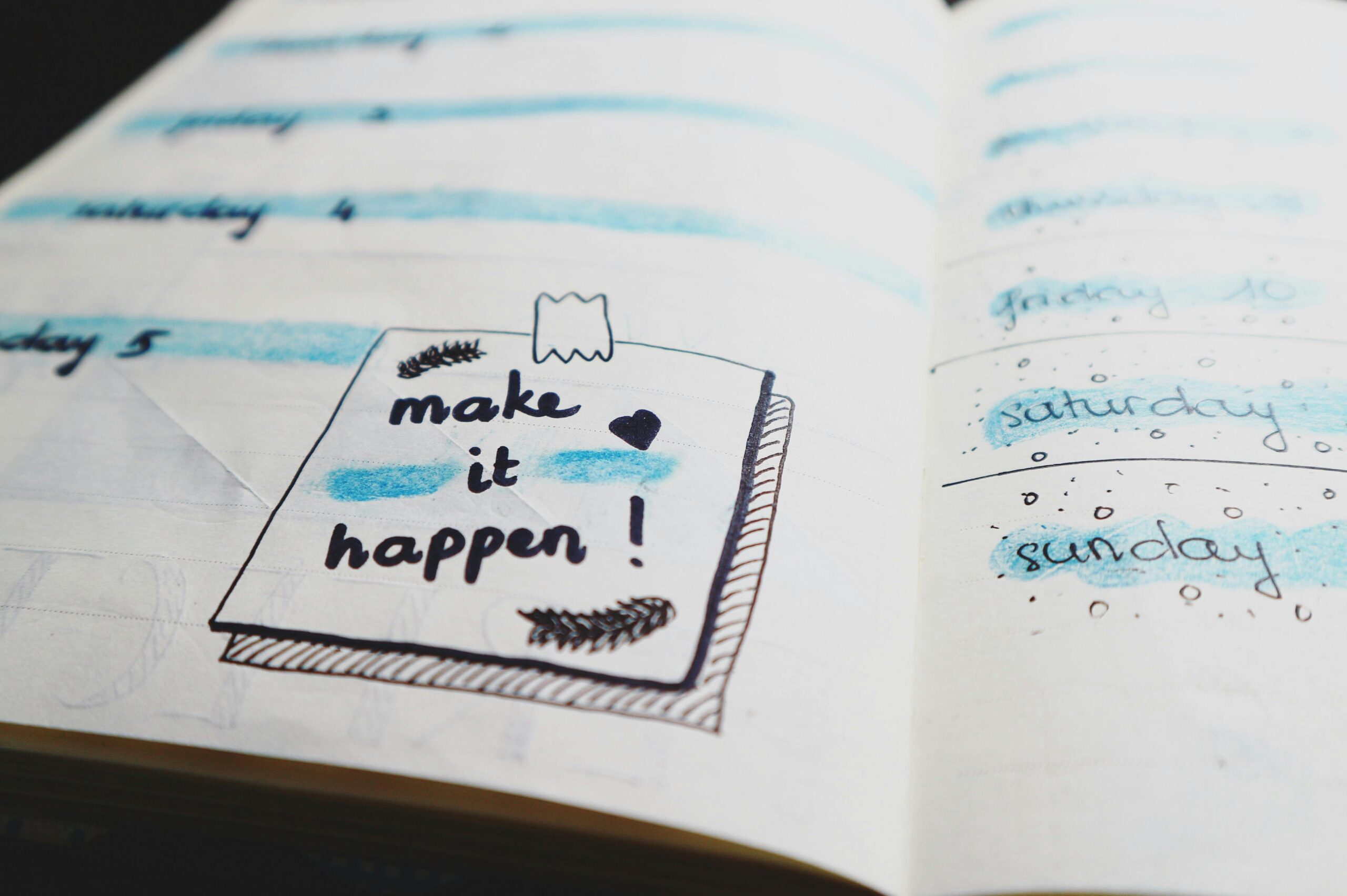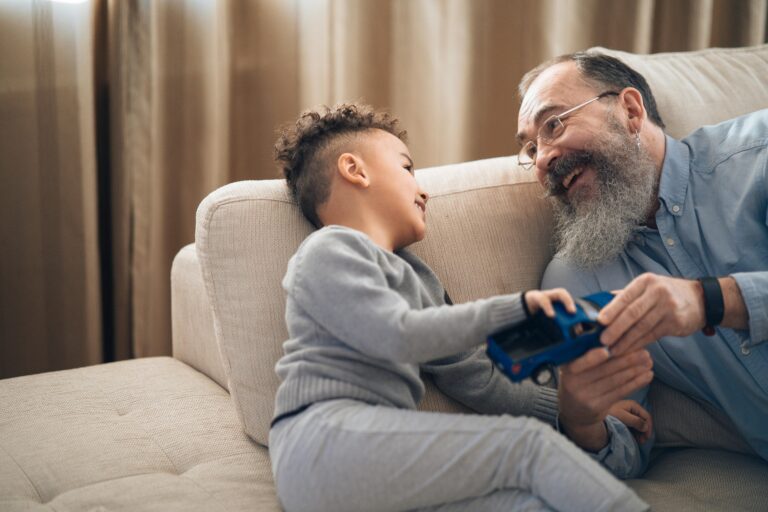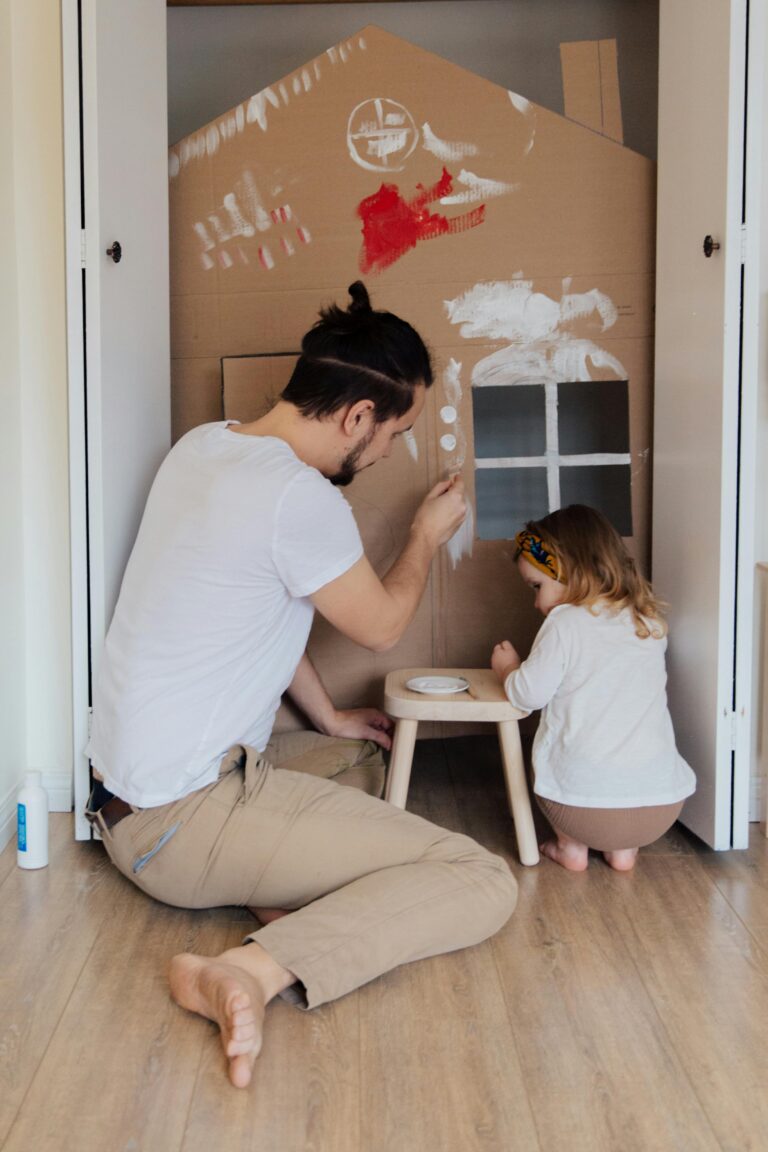Let’s get honest for a second: when’s the last time you and your partner actually took care of yourselves together? And no, binge-watching Netflix while doom-scrolling on your phones doesn’t count.
Most couples I work with are so caught up in work stress, household chaos, and just surviving daily life that they forget something crucial, you can’t pour from an empty cup.
And trying to maintain a healthy relationship when you’re both running on fumes? That’s like trying to charge your phone with a dead battery. Spoiler alert: it doesn’t work.
Self-care as a couple isn’t some luxury reserved for people with unlimited time and money. It’s actually one of the smartest investments you can make in your relationship.
When you create rituals that help you both recharge together, something beautiful happens. You reconnect; remember why you fell for each other. You build emotional intimacy without even trying that hard.
I’ve watched countless couples transform their relationships simply by establishing consistent self-care practices. We’re talking about small, doable rituals that fit into real life, not Instagram-perfect scenarios that nobody actually maintains.
These are the everyday moments that keep your bond strong when life gets messy (because it will).
Ready to stop running on empty and start filling each other’s cups? Let’s talk about self-care rituals that actually work.
15 Self-Care Rituals To Connect As A Couple
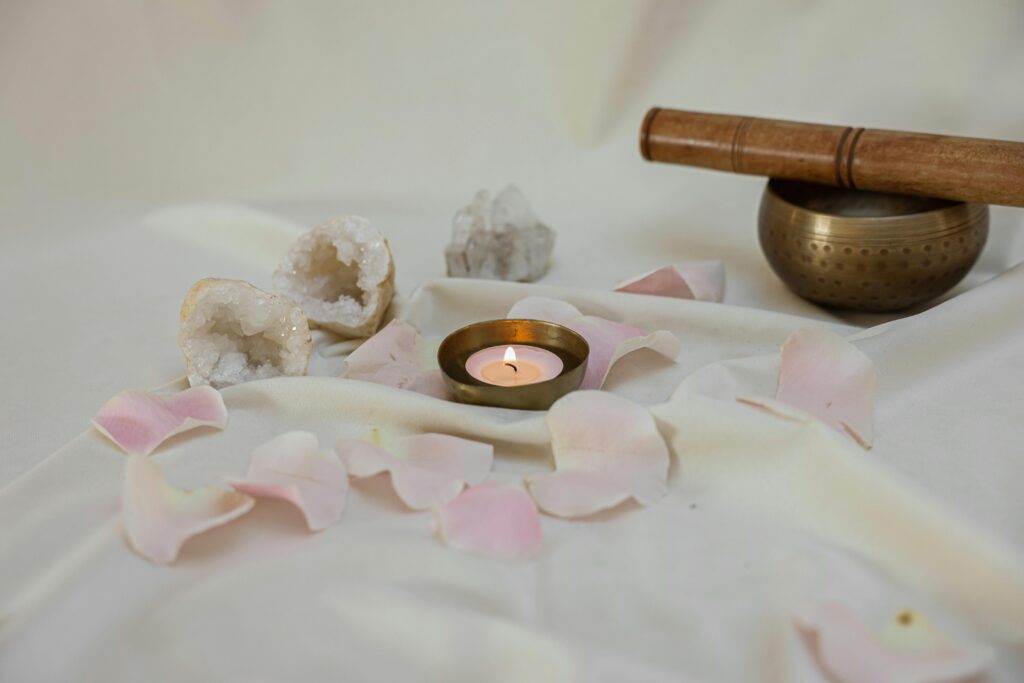
These aren’t your typical “light a candle and everything’s magically better” suggestions. These are practical, psychology-backed rituals that create real connection and genuine rest for both of you.
1. Morning Coffee Or Tea Together

There’s something almost sacred about those first quiet moments of the day. Before work emails start flooding in, before the kids need breakfast, before life gets loud, that’s your window for connection.
Sharing morning coffee or tea isn’t about having deep philosophical conversations (though those are welcome). It’s about simply being present with each other before the chaos begins. No phones. No TV. Just you two and your beverages of choice.
I started this ritual with my husband after noticing we’d go entire days barely talking beyond logistics. “Did you pay the electric bill?” “What’s for dinner?” “Can you pick up milk?”
We were roommates, not partners. So, we committed to 15 minutes every morning with our coffee. No agenda, no pressure.
What makes this work:
- It creates predictable connection time
- Morning is when you’re least stressed (usually)
- Caffeine makes everything better 🙂
- It sets a positive tone for your whole day
Some mornings you’ll chat about plans. Other mornings you’ll sit in comfortable silence. Both are valuable. The ritual is the showing up part, not what you talk about.
How to make it stick: Prep your coffee setup the night before so there’s zero friction in the morning. Use nice mugs, seriously, this matters more than you’d think. Make it feel special, not routine.
2. Weekly Nature Walks
Your nervous system is probably fried. Actually, I can almost guarantee it is. Between screens, stress, and stimulation overload, most couples are operating in constant fight-or-flight mode without even realizing it.
Nature is the antidote. Walking outside together, particularly in green spaces, literally calms your nervous system. Science backs this up.
Your cortisol drops, your blood pressure lowers, and suddenly that thing you were arguing about seems less catastrophic.
One couple I worked with was on the verge of divorce. They fought constantly. I asked them to commit to one 30-minute nature walk per week, no discussing “hot topics,” just walking and being together.
Within a month, they reported feeling more connected than they had in years. The walks gave them space to decompress without the pressure of fixing everything immediately.
Benefits you’ll actually notice:
- Reduced stress and anxiety
- Better sleep quality
- More natural, flowing conversations
- Physical exercise without it feeling like a chore
- Time away from household triggers
Find a local trail using AllTrails or just explore your neighborhood. The location matters less than the consistency.
3. Candlelit Dinners At Home
Okay, this might sound cheesy, but hear me out. The way you eat together reveals a lot about your relationship.
Most couples either eat in front of screens, eat at different times, or rush through meals while discussing problems. That’s not nourishment, that’s just fuel consumption. There’s a massive difference.
A candlelit dinner at home transforms an ordinary meal into an intentional experience. You’re not just eating; you’re connecting. The candlelight naturally softens the mood, slows everything down, and creates an atmosphere that invites intimacy.
I try to do this with my husband at least twice a month. We put phones in another room, light candles (even if we’re eating takeout), put on some jazz, and actually enjoy the food and each other. Some of our best conversations happen during these dinners.
Make it work for you:
- You don’t need fancy food, ambiance matters more
- Use real plates, not paper (it changes the experience)
- Put on music that makes you both feel good
- Make a rule: no problem-solving during dinner
- Take turns planning themed dinners from different cuisines
Order from your favorite restaurant if cooking feels overwhelming. The point is the ritual, not proving you’re a master chef.
4. Evening Meditation
I know, I know, meditation sounds boring or intimidating or both. But couples who meditate together report significantly better emotional regulation and relationship satisfaction. That’s not woo-woo; that’s data.
Meditation as a couple doesn’t mean sitting in perfect lotus position for an hour while you battle your racing thoughts.
It can be as simple as 10 minutes of guided meditation before bed, sitting together, breathing intentionally, and giving your overactive minds a break.
When you practice calming your nervous systems together, you’re essentially training yourselves to stay regulated during conflict. You’re building the mental muscles that help you not completely lose it when your partner loads the dishwasher “wrong” again.
How to start (even if you hate meditation):
- Use apps like Headspace or Calm for guided sessions
- Start with just 5 minutes, seriously, that’s enough
- Try couples-specific meditations designed for partners
- Focus on breath work if traditional meditation feels too weird
- Make it a wind-down ritual before bed
The goal isn’t to empty your mind completely (good luck with that). It’s to practice being still together, which is harder than it sounds in our hyperconnected world.
5. Shared Reading Time
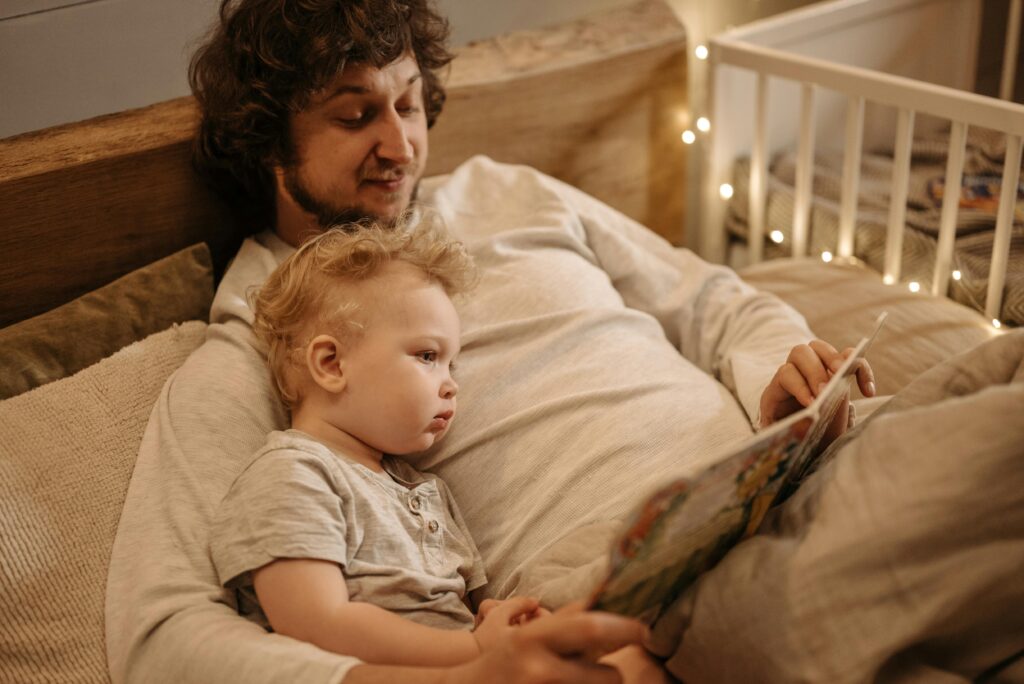
Reading together creates parallel intimacy, you’re doing separate things but together, which is actually healthy relationship behavior.
This looks different than you might think. You’re not necessarily reading the same book (though you can).
You’re creating a cozy reading environment where you both read your own books side by side. Maybe you’re on the couch with your feet touching. Maybe you’re in bed propped up on pillows. The physical closeness combined with the quiet focus creates a unique type of connection.
I love this ritual because it satisfies that need for individual space while still being together. You’re recharging your own batteries but in proximity to each other. It’s introvert heaven, honestly.
Ways to enhance this ritual:
- Create a reading nook with good lighting and comfortable seating
- Use Goodreads to share book recommendations
- Take turns reading interesting passages aloud
- Discuss what you’re reading over coffee the next morning
- Join a virtual book club together on Book of the Month
Some couples prefer audiobooks. Put on a story you both enjoy while cuddling or doing a puzzle together. Same concept, different format.
6. Cooking Meals Together

The kitchen can be your relationship battleground or your playground. Choose playground, please.
Cooking together forces teamwork, communication, and problem-solving, all relationship skills disguised as meal prep. Plus, you get to eat delicious food at the end, which is always a win.
One of my clients was convinced her husband was “terrible at cooking” and excluded him from the kitchen entirely. When I challenged them to cook together twice a week, she discovered he actually had skills, she’d just never given him space to contribute.
Their cooking sessions became less about the food and more about collaboration and laughing at their mistakes.
Keys to successful cooking together:
- Assign clear roles (one chops, one cooks, one does dishes)
- Try recipes that are slightly challenging but doable
- Use platforms like Tasty or Allrecipes for inspiration
- Make it fun with music and maybe wine
- Don’t aim for perfection, aim for enjoyment
Bonus tip: Take a virtual cooking class together on Cozymeal or watch cooking videos and recreate the dishes. Make it an adventure, not a chore.
7. Massage Exchange
Let me be clear: massage exchange is intimacy gold. Physical touch releases oxytocin (the bonding hormone), reduces cortisol (the stress hormone), and creates a safe space for vulnerability.
You don’t need professional skills. You just need willingness to touch your partner with intention and care. Even a mediocre back rub given with love beats a professional massage given by a stranger.
I suggest this to every couple I work with, especially those struggling with physical intimacy. Often, non-sexual touch has disappeared from their relationship.
Everything is either completely platonic or sexual with nothing in between. Massage fills that crucial middle ground.
Setting the scene:
- Dim lights or use candles
- Play spa music or nature sounds on Spotify
- Use quality massage oil (coconut or almond oil work great)
- Warm your hands first
- Focus on shoulders, neck, back, and feet
- Take turns so both partners receive
FYI, this doesn’t have to lead to sex (though it can). The value is in the intentional, caring touch regardless of where it goes.
8. Yoga Or Stretching Sessions

Your body holds your stress. Seriously, tension from work, arguments, and life stress literally lives in your muscles. Stretching releases it.
Doing yoga or stretching together creates body awareness, promotes relaxation, and honestly just feels good. You don’t need to be flexible or experienced. You just need to be willing to move your bodies together.
Couples yoga specifically involves poses where you support each other, which becomes a beautiful metaphor for your relationship. You’re literally and figuratively holding each other up.
Getting started:
- Find couples yoga videos on YouTube
- Try beginner-friendly apps like Down Dog
- Attend local couples yoga classes
- Start with basic stretches if yoga feels intimidating
- Make it playful, not perfect
I’ve seen the most inflexible, gym-hating couples transform through gentle stretching routines. It’s not about becoming yoga masters; it’s about moving and breathing together.
9. Couples’ Bath Or Spa Time
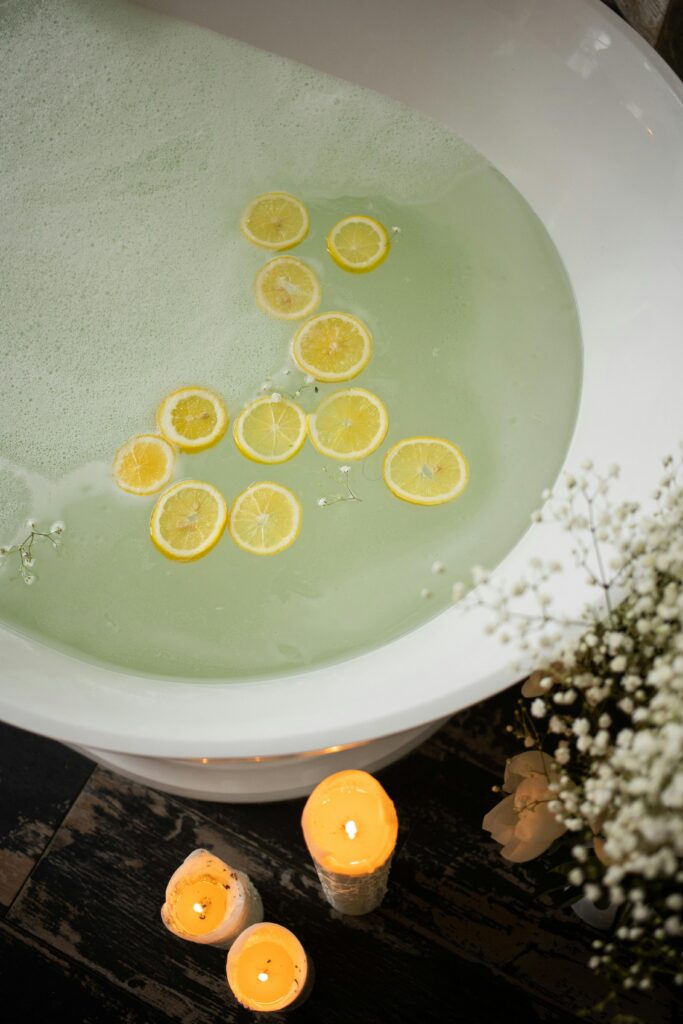
This is peak luxury self-care, and you absolutely deserve it. Creating a spa-like experience at home costs way less than actual spa visits and can be equally relaxing.
Drawing a bath together, lighting candles, adding bath salts or essential oils, and just soaking, it’s simple but profound. The warm water relaxes your muscles while the close proximity encourages conversation or comfortable silence.
How to create the vibe:
- Use Epsom salts for muscle relaxation
- Add essential oils like lavender or eucalyptus
- Light candles around the bathroom
- Play soft music or nature sounds
- Keep the lighting low and cozy
- Have warm towels ready for afterward
If a shared bath isn’t your thing (some tubs are tiny, let’s be real), give each other facials, foot soaks, or take turns doing spa treatments for each other. The pampering is the point.
10. Listening To Music Or Podcasts Together
Music bypasses your logical brain and hits your emotions directly. Sharing music with your partner is sharing your inner world.
Create playlists for each other on Spotify or Apple Music. Include songs that remind you of them, songs from your relationship timeline, or just songs you think they’d love. Listening together becomes a vulnerability exercise disguised as entertainment.
Podcasts work similarly. Find shows you’re both interested in, relationship podcasts, true crime, comedy, whatever resonates. Listen together during drives, while doing chores, or during evening wind-down time.
Podcast recommendations for couples:
- Where Should We Begin? (relationship therapy sessions)
- The Love, Happiness & Success Podcast
- Modern Love (relationship stories from The New York Times)
- Shameless Sex (if you want to explore intimacy topics)
Music rituals to try:
- Sunday morning playlist ritual
- “Song of the week” exchanges
- Creating decade-specific playlists together
- Dance parties in the kitchen (yes, really)
Music and podcasts give you shared cultural touchstones and conversation starters that naturally deepen connection.
11. Journaling Together (In Silence)
Writing clarifies thinking. Journaling together creates space for individual reflection while maintaining physical closeness with your partner.
This ritual feels counterintuitive, you’re together but not interacting. But that’s exactly what makes it powerful. You’re honoring each other’s need for introspection while still being present. It’s parallel intimacy at its finest.
Set a timer for 10-15 minutes. Sit together in the same room. Write whatever comes to mind, no rules, no judgment. When the timer goes off, you can share insights if you want, but there’s no pressure.
Journaling prompts for couples:
- What made me feel grateful today?
- What’s one thing I appreciate about my partner right now?
- What’s weighing on my mind lately?
- What’s one goal I have for our relationship?
- What made me laugh this week?
Tools that help:
- Get nice journals that feel special
- Try Day One digital journaling app
- Use Couple app for shared journaling
Some of my clients were skeptical about this one until they tried it. Now it’s their favorite ritual because it gives permission for quiet, reflective time without guilt or distraction.
12. Planning Weekly Goals Or Intentions
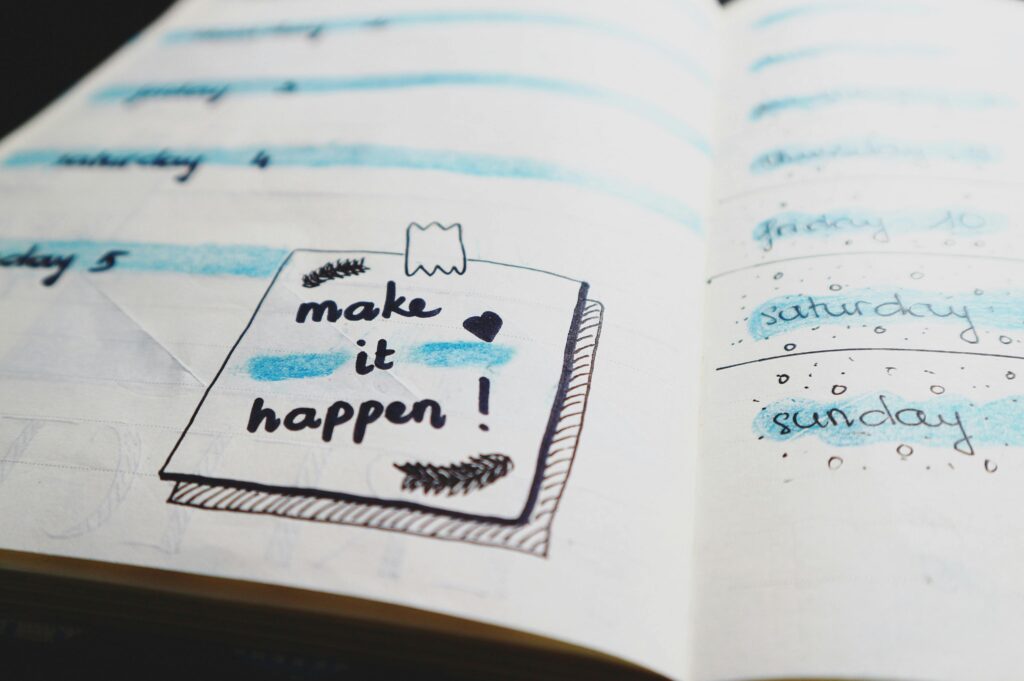
Couples who plan together stay together. Okay, I made that up, but there’s truth in it.
Setting aside time each week to align on goals, intentions, and priorities keeps you functioning as a team rather than two people going in different directions. This isn’t about micromanaging each other, it’s about staying connected to each other’s inner lives.
Sit down Sunday evenings or Monday mornings. Share what’s on your plate for the week. Discuss individual goals and relationship intentions. This simple practice prevents the “I had no idea you were stressed about that” moments that create distance.
What to cover in your planning sessions:
- Work obligations and stress points
- Personal goals for the week
- Date night or quality time plans
- Household logistics (boring but necessary)
- One thing each person needs from the other
Tools to help you plan:
- Use Trello for shared goal boards
- Try Notion for relationship planning
- Keep a shared calendar on Google Calendar
- Use the Gottman Card Decks App for conversation starters
This ritual prevents resentment from building up. You’re addressing needs proactively instead of reactively, which is relationship genius.
13. Cuddling Before Sleep
IMO, cuddling is the most underrated relationship maintenance tool. Physical touch is literally your love language whether you think it is or not.
The pressure of modern life means many couples fall into bed exhausted, scroll their phones, and pass out without any physical connection. Then they wonder why intimacy has disappeared. This ritual fixes that.
Commit to 10-15 minutes of cuddling before sleep. No phones, no TV, just physical closeness. Talk about your day, express appreciation, or just breathe together. The oxytocin release from cuddling improves sleep quality and relationship satisfaction.
Cuddling benefits (backed by science):
- Lowers blood pressure and heart rate
- Reduces cortisol and increases oxytocin
- Improves immune function
- Creates feelings of safety and security
- Often leads to better communication
Make it count:
- Vary positions, spooning, face-to-face, whatever feels good
- Use this time for appreciation or gratitude
- Keep the conversation light and positive
- Let it naturally lead where it leads (or not)
One couple I worked with was barely touching anymore. I assigned cuddling homework, 10 minutes nightly, non-negotiable. Within two weeks, they reported feeling more emotionally connected than they had in months.
Never underestimate the power of simple physical affection.
14. Digital Detox Days

Your phones are destroying your relationship. There, I said it. You can’t build intimacy when you’re both addicted to dopamine hits from notifications.
Digital detox doesn’t mean throwing your phone in a lake (tempting though). It means setting boundaries around technology so you can actually be present with each other.
Choose one day a week or even just a few hours where phones go in a drawer. No checking work emails, no scrolling social media, no “just quickly looking at this one thing.” Real, uninterrupted presence.
What happens during digital detox:
- Awkwardness at first (you’ll notice how often you reach for your phone)
- Real conversations start happening
- You remember what your partner’s face looks like
- Boredom turns into creativity
- Connection deepens naturally
Ideas for detox time:
- Cook a meal from scratch
- Take a long walk without GPS
- Play board games or cards
- Have actual conversations about meaningful topics
- Work on a puzzle together
- Make art, have sex, take a bath, literally anything but screens
Use Forest app to gamify phone-free time if you need extra motivation. Plant virtual trees while you ignore your devices. Whatever works.
15. Evening Gratitude Sharing
Gratitude is relationship rocket fuel. Ending your day by acknowledging good things rewires your brain toward positivity and appreciation.
Before bed, share three things you’re grateful for. Include at least one thing about your partner or your relationship. This practice shifts your focus from complaints and problems to appreciation and abundance.
I do this with my husband every single night. Some nights it’s profound stuff. Other nights it’s “I’m grateful the dishwasher didn’t break today.” Both are valid. The point is training your brain to seek positive things instead of defaulting to negative.
Why this works psychologically:
- Counteracts negativity bias (your brain’s tendency to focus on problems)
- Increases positive emotions and life satisfaction
- Strengthens your emotional bond
- Creates a positive bedtime routine
- Helps you fall asleep with good feelings
How to do it effectively:
- Be specific (not just “I’m grateful for you”)
- Take turns so both partners share
- Make it non-negotiable (even on bad days)
- Write them down occasionally in a shared journal
- Acknowledge small things, not just big moments
- Try the Gratitude App if you want to track your gratitude journey or get daily prompts.
Final Thoughts
Your relationship is only as strong as the effort you invest in it. Self-care rituals aren’t luxuries they’re what keep your bond healthy and resilient.
Start small with a few that feel right, stay consistent, and build from there. The strongest couples don’t avoid challenges; they stay connected through small, daily choices that show love and presence.
When you care for yourselves together, everything improves communication, laughter, and connection. Begin today, even with one small ritual. Your relationship deserves your best energy, not what’s left over.
Now go put your phones down and actually talk to each other. Your relationship will thank you.
Pin this for later!
